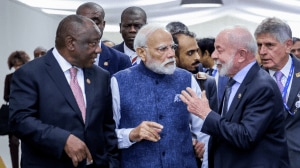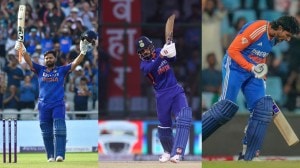In 2002, azadi, polls came together here, now Handwara rings with boycott
If there is one constituency that sums up Kashmir’s indifference to these Assembly elections, it is perhaps Handwara.

If there is one constituency that sums up Kashmir’s indifference to these Assembly elections, it is perhaps Handwara. In 2002, this place had emerged as the symbol of a new discourse in the Valley when a candidate — a cloth merchant, Ghulam Mohideen Sofi — contested the polls on a clear separatist agenda. For the first time, slogans of azadi and elections were heard in the same breath. When Sofi said he agreed with the separatists that the Kashmir dispute needed to be resolved through a tripartite dialogue, respecting the “aspirations of Kashmiri people”, but “simultaneously sought a mandate to address the issues of local governance, development and other day-to-day problems faced by the people” through participation in the Assembly elections, even the Hurriyat Conference was forced to take note.
Sofi won, defeating a top National Conference leader and a senior minister in the Farooq Abdullah Government, Choudhary Mohammad Ramzan.
But if Sofi and his election in Handwara represented a new reality of Kashmir in 2002, his depleted chances this time tell the tale of Kashmir six years later. The recent separatist groundswell, the four-month-long protest over the Amarnath land controversy and the use of force by the Government to quell the protests have put a question mark on the peace process launched after Mufti Mohammad Sayeed took over as Chief Minister in 2002, and raised doubts about a campaign that talks of azadi and elections in the same breath. In fact, the separatists across the moderate-hardline divide have come together to call for a boycott of the polls now.
All this has left Sofi fighting with his back to the wall. Quite a change from that day of August 29, 2002, when thousands had joined him raising slogans for azadi and elections as he went to file his nomination papers. He was also riding the sympathy wave generated by the killing of top Hurriyat and Peoples Conference leader Abdul Gani Lone, who had been assassinated just a few months before. Sofi was known to be close to Lone. Though Peoples Conference denied Sofi was their proxy candidate, there were few takers for this.
The Hurriyat, which has a strong base across north Kashmir, particularly Kupwara district that includes Handwara constituency, had taken note of Sofi’s campaign. While there was a split among the separatists over the issue of de-linking electoral politics from the larger question of the Kashmir dispute, it had piqued the interest of a section.
The Sofi phenomenon, in fact, worked in the broader context of the 2002 Assembly polls as well, with an otherwise exclusively “separatist” discourse becoming part of mainstream electoral politics. It was an election fought around the agenda of “the need to resolve the Kashmir dispute”, “a velvet glove policy towards separatists and militants” and a “demand for Pakistan’s active role in the resolution process”.
This was reflected in the emergence of the Kashmir-centric Peoples Democratic Party, with its message of change and its separatist rhetoric. The ruling National Conference, which had particularly been shy of such a discourse because of its past experiences, suffered.
Sofi’s victory over an NC stalwart in Handwara by merging mainstream electoral politics with the separatist agenda was reflective of the PDP gains against the NC and the change in the contours of mainstream politics across Kashmir.
After the 2002 polls, Sofi joined the coalition government and became a minister in the Mufti Sayeed-led government. The incumbency factor may also take a toll on Sofi’s chances in the coming elections, as well as his strained relations with the Peoples Conference and the Lone family. Peoples Conference leader Sajjad Lone is among the most vocal supporters of a poll boycott.
This has brightened the chances of NC leader Choudhary Mohammad Ramzan, though a voter boycott may affect him as well. Handwara is among the four constituencies in Kupwara district where Peoples Conference has a substantial political base.








- 01
- 02
- 03
- 04
- 05























